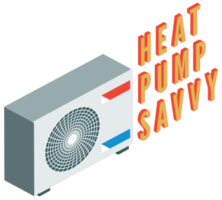Heat Pumps in Kingston — The Complete Guide
Heat pumps are increasingly popular for home heating and cooling — even in Ontario’s cold winters. Is it a smart choice to get a heat pump in Kingston though?
Local conditions decide whether a heat pump is a smart choice. Heat pump-friendly conditions are:
- Manageable winter weather
- Favourable electricity vs. fuel costs
- Generous government rebates
- Clean electricity
Kingston rates good or excellent on all four criteria. Heat pumps are a great choice here!
Table of Contents
What We Mean by Heat Pump
All heat pumps work in fundamentally the same way: they gather heat energy from outside, concentrate that heat and pipe it into your home. (In summer they work in reverse, pulling unwanted heat out of your home — just the way an air conditioner does).
- Air-source heat humps gather heat by blowing outdoor air over copper coils filled with a refrigerant fluid in an outdoor unit. Just the same as a central a/c outdoor unit.
- Ground-source heat pumps (aka geothermal) use liquid-filled tubes sunk into the earth.
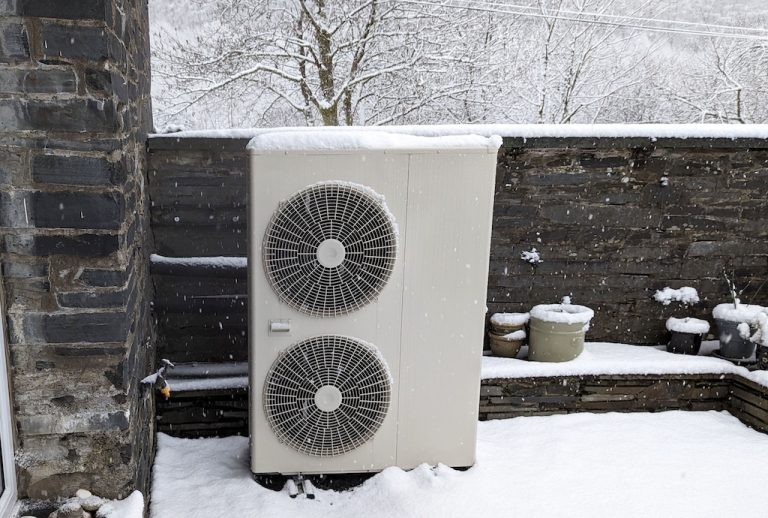
More specifically we’re going to focus on cold climate air source heat pumps (aka ccASHP). Cold climate heat pumps are capable home heaters even in our cold winters.
Air source heat pumps come in two types — central (aka ducted) and mini-split. Performance is similar across the two and this guide covers both.
Heat Pumps in Our Winter Weather
●●○ good
Winters in Kingston are long and cold — nothing a good cold-climate heat pump can't handle though.
Heat Pump Winter Performance
Heat pumps deliver more heat energy than they consume in electrical energy. They pull off this unique feat by collecting heat energy from the outdoor air and moving it inside, instead of generating heat (the way furnaces and all other heaters do).
Because heat pumps gather heat energy from the outside air their performance varies with temperature. When there’s less heat in the air they have to work harder.
We go into the details of cold weather heat pump performance elsewhere… here are the headlines:
- With falling temperatures the capacity (total heating ability) of heat pumps decreases.
- The efficiency with which a heat pump converts electricity to useful heat also falls with outdoor temperatures.
To understand how a heat pump will perform in a particular location we look at two measures of winter weather:
- Heating Design Temperature — how cold are our cold snaps? This tells us how well a heat pump’s capacity will keep up with your heating needs on the coldest days.
- HSPF region (Heat Pump Seasonal Performance) — how demanding are our winters are overall? Used to estimate how energy efficient a heat pump will be over the entire winter season.
Heating Design Temperature
Kingston’s heating design temperature is -19.9°C — that’s the depth of winter freeze that hvac experts use to design heating systems. 1
A good quality cold-climate certified heat pump can take that low in stride and deliver all of the heat you need even on the coldest days.
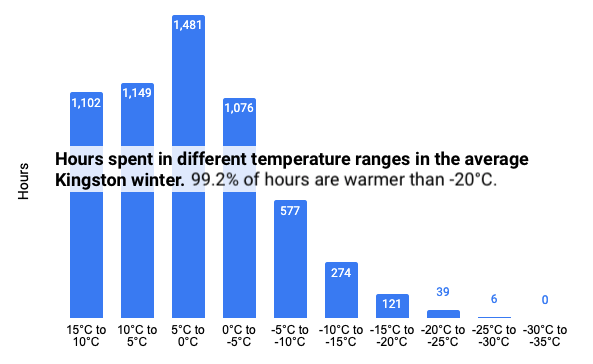
The chart confirms the logic of the design temperature — only a tiny number of hours fall below -20°C in a Kingston winter.2
Talking about heat pumps and temperatures we always use "dry bulb" temperatures. Dry bulb simply means temperature without windchill.
Windchill effects humans, not heat pumps.
Winter Climate Region
Kingston sits at the mildest end of HSPF (Heating Seasonal Performance Factor) region 5. Which means good things for heat pump energy efficiency.
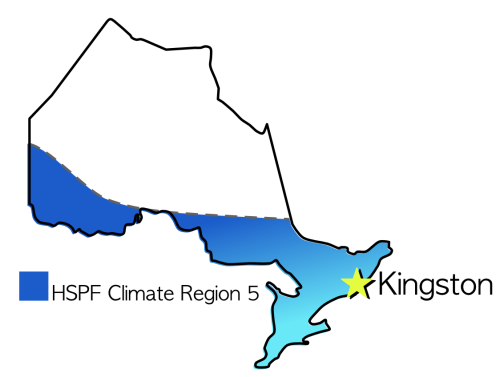
In region 5, a high quality cold-climate heat pump should average a COP (Coefficient of Performance) of 2.5. 3
That’s a lot of jargon which boils down to good news.
A COP of 2.5 means that for every unit of electricity you feed to the heat pump it will deliver an impressive 2.5 units of heat energy. That’s more than twice as efficient as electric baseboard heating (which can never exceed a COP of 1).
Summer Comfort
Kingston has a “heating dominant” climate — our winter cold demands more from hvac equipment than our summer heat.
Any heat pump that can handle our winters will make an excellent a/c for the summer months. (Heat pumps are actually high-efficiency air conditioners with some extra components allowing them move heat into your home when you need it).
Heat Pump vs. Natural Gas Running Cost
●●○ good
Heating costs will be cheaper with a heat pump vs natural gas.
Alongside winter weather, fuel costs determine how affordable a heat pump will be to run.

$0.11 to $0.13/kWh 9
Kingston Hydro rates are very similar to the rest of the province.

$0.53/m³ of natural gas 10
Kingston's natural gas is about 20% more expensive than the Ontario average.
Kingston’s higher gas price tips the balance in favour of electric heat pumps.
At current rates a heat pump could save you around 5% on your bill compared with a high-efficiency natural gas furnace.4
Heat Pump vs. Heating Oil Running Costs
●●● excellent
Heating costs will be significantly cheaper with a heat pump vs oil heating.
Heating oil would have to be 48¢/litre or less to compete with heat pump running costs5.
Heating oil prices vary by supplier and contract — but you’re probably paying 2-3x that much in Kingston. So switching from oil to a heat pump brings huge running cost savings.
Heat Pump vs. Propane Running Costs
●●● excellent
Heating costs will be significantly cheaper with a heat pump vs propane.
At current prices propane isn’t even close to being cost-competitive with electric heat pumps.
In fact propane would have to cost around 30¢/litre to be competitive6. You’re probably paying several times that much for propane. So the savings of switching to electric heat pump would be substantial.
Heat Pump vs. Electric Heat Running Costs
●●● excellent
Heating costs will be significantly cheaper with a heat pump vs electric resistive heat.
Heat pumps and electric baseboards both run on electricity. That’s where the similarities end though.
Because heat pumps move heat rather than generating it they’re vastly more energy efficient. At peak performance a heat pump will use one-fifth the electricity of an equivalent baseboard system.
A heat pump won’t run at peak efficiency all winter but… you can expect to cut your heating bill in half by switching from baseboards to a cold climate heat pump.
Government Rebates
●●● excellent
Significant heat pump rebates are available from both Federal and Municipal governments.
Installing a heat pump is likely to cost more than a traditional furnace and central a/c. So it’s nice to have government rebates to help with the cost (they’re in it for the energy savings and environmental benefits).
In Kingston you can qualify for rebates from both federal and municipal governments:
- The federal Greener Homes program offers rebates up to $5,000 towards heat pump installation. In Ontario the program is administered by Enbridge as Home Efficiency Rebate Plus (Enbridge runs the program but you don’t need to be a customer).
- The feds also offer Greener Homes interest free loans up to $40,000 for energy efficiency improvements to your home.
- Better Homes Kingston rebates up to $5,000 for reductions in your home’s greenhouse gas footprint.
The starting point for all three programs is to get an EnerGuide Home Energy Evaluation. Sign up through Home Efficiency Rebate Plus to start the ball rolling before you get any work done.
The local org Sustainable Kingston is a good place to get more information.
Clean Electricity
●●● excellent
A heat pump is hands-down the most sustainable way to heat your home in Kingston.
In Canadian homes nearly two-thirds of energy consumption goes to heating7. So choosing an environmentally friendly heating option is the best way to reduce your footprint.
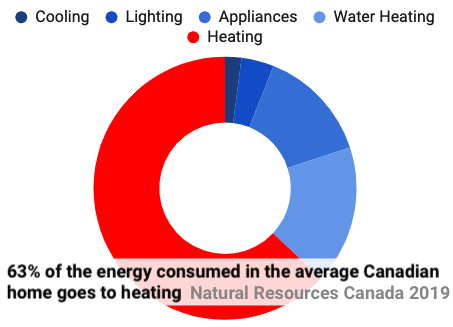
A heat pump is hands down the most efficient way to heat with electricity. If the electricity it consumes is from low-carbon sources that’s a winning combination. Ontario’s electricity grid is one of the cleanest in the world. Over 85% of the electricity consumed in the province comes from low-carbon sources8.
Our clean grid gives electric heat pumps a massive environmental benefit over fossil fuels like natural gas.
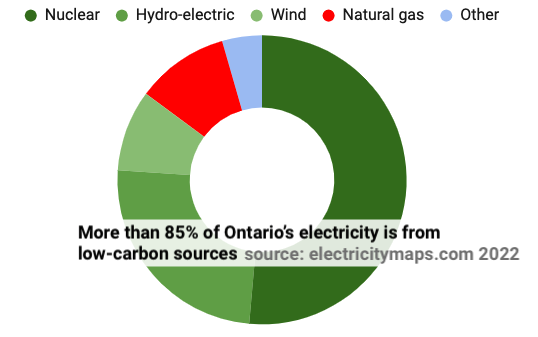
Do You Need a Second Heat Source in Kingston?
For many homes, a properly sized cold climate heat pump will be able to meet 100% of your heating needs.
There are reasons you might want to add in a second heat source though.
- Power Outages — Unless you have a large generator your heat pump goes out when the power goes out. All modern furnaces need electricity to run too but they can be powered by a small generator.
- Equipment Failures — Having more than one way of heating your home is handy in case of equipment failure.
- Fuel Flexibility — Gas furnaces in particular might run cheaper than a heat pump during cold snaps. So having the option to switch fuels could save money.
- Extreme Cold — A secondary heat source can pick up the slack if your heat pump can’t quite handle the coldest days.
- Lower Upfront Costs — If you have a modern gas furnace already it’s simple to add in a ducted heat pump that will handle heating on milder days. Because your heat pump doesn’t need to handle the coldest days you can opt for mid-range equipment and still save useful money when the temperatures are mild.
Some of the common options for second heat sources:
- Hybrid Heat Pump (aka dual-fuel) — Combines a ducted heat pump with an ordinary furnace. They can’t operate at the same time so a smart thermostat handles switching from heat pump to furnace as needed.
- Aux heat — Adds resistive heat coils into the indoor unit of a ducted heat pump. Relatively cheap to add and provides insurance against heat pump failure or exceptional cold.
- Separate heat — A totally separate heating option like a propane fireplace or a wood stove.
How Much Does a Heat Pump Cost in Kingston?
That depends… ballpark to install a whole-home cold climate heat pump system in a mid-sized home is $15,000 to $25,000 before rebates.
All kinds of factors play into the price. Houses that seem identical may have very different requirements:
- Ducts that are well sized to move the larger air volumes that heat pumps push vs. new ductwork required.
- Plenty of capacity available on your electrical panel vs. electrical work and supply upgrades needed to support a heat pump system.
- Adding a mid-range heat pump to your furnace to provide heat in milder weather vs. a top-of-the line heat pump to handle 100% of your heating needs.
Working with local hvac contractors is the way to understand the options and costs for your home.
Finding a Heat Pump Installer in Kingston
Selecting a knowledgeable and communicative hvac company is the number one factor in a successful installation.
Most hvac companies claim they install heat pumps. Only some have the experience and attitude that assures good results.
Word-of-mouth is a great way to find the right hvac company. Talk to neighbours, friends and acquaintances. Read online reviews and check with local facebook groups and forums. Look for heat pump specific experiences — companies can be fantastic with furnaces but clueless when it comes to heat pumps.
Create a shortlist of likely companies and get them in for quotes. Ask lots of questions and trust your instincts.
More Resources for Heat Pump Curious Kingstonians
Sign up to be the first to know when the new stuff launches.
© Heat Pump Savvy 2023. All Rights Reserved.
